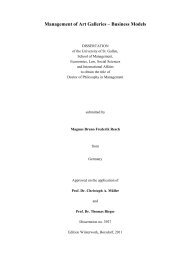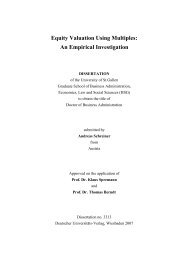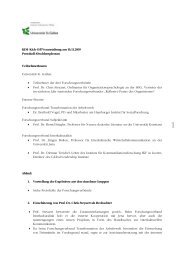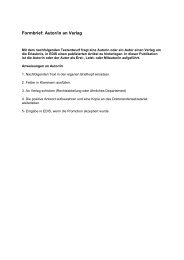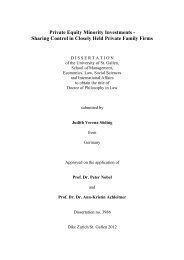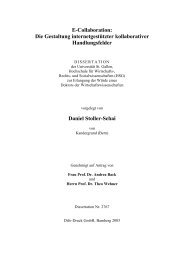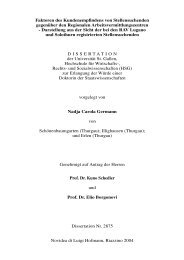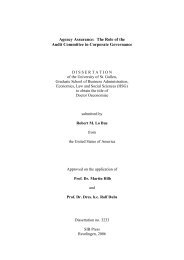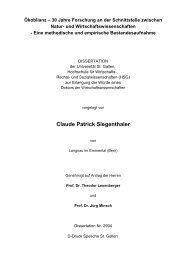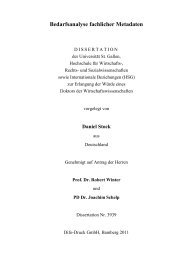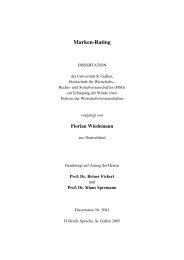The Impact of Direct Democracy on Society - Universität St.Gallen
The Impact of Direct Democracy on Society - Universität St.Gallen
The Impact of Direct Democracy on Society - Universität St.Gallen
- No tags were found...
You also want an ePaper? Increase the reach of your titles
YUMPU automatically turns print PDFs into web optimized ePapers that Google loves.
– 12 –should be expected in direct democracies: first, less m<strong>on</strong>ey is wasted <strong>on</strong> undesired projectsbecause voters veto them through fiscal referenda and initiatives 8 ; sec<strong>on</strong>d, governmentalbudgets should be smaller than in less direct democratic systems because fewer financialprojects and laws triggering new expenses are approved by the electorate if voters are fiscallyc<strong>on</strong>servative 9 ; and third, public goods might be provided more efficiently as bureaucrats'discreti<strong>on</strong>ary power is also limited 10 . Smaller governmental budgets should in turn bringabout lower income and/or property tax rates, thereby relaxing the individual's budgetc<strong>on</strong>straint in c<strong>on</strong>trast to those <str<strong>on</strong>g>of</str<strong>on</strong>g> voters living in a more representative democratic system. Inadditi<strong>on</strong>, because <str<strong>on</strong>g>of</str<strong>on</strong>g> the resulting increase in individual utility, pers<strong>on</strong>s living in a system withstr<strong>on</strong>g direct democracy should experience a higher level <str<strong>on</strong>g>of</str<strong>on</strong>g> well-being than those livingunder a purely representative political regime 11 .In fact, empirical evidence already partly corroborates most <str<strong>on</strong>g>of</str<strong>on</strong>g> these c<strong>on</strong>jectures. In general,an allocati<strong>on</strong> closer to the median voters' preferences in direct democracies is observed byPOMMEREHNE (1978) for Switzerland 12 and MATSUSAKA (2000) for the U.S.A. 13 . As regardsthe budgetary and cost-reducing impacts <str<strong>on</strong>g>of</str<strong>on</strong>g> direct legislati<strong>on</strong>, several studies based <strong>on</strong> typicalpublic finance models for expenditure regressi<strong>on</strong>s show a spending and revenue loweringimpact <str<strong>on</strong>g>of</str<strong>on</strong>g> direct democracy <strong>on</strong> combined cant<strong>on</strong>al and subfederal budgets, and anaccumulati<strong>on</strong> <str<strong>on</strong>g>of</str<strong>on</strong>g> less debt per capita in Swiss municipalities with str<strong>on</strong>ger direct democraticdirect legislati<strong>on</strong>. For a discussi<strong>on</strong> <strong>on</strong> the influence <str<strong>on</strong>g>of</str<strong>on</strong>g> interest groups, as well as why a mitigati<strong>on</strong> <str<strong>on</strong>g>of</str<strong>on</strong>g>informati<strong>on</strong> asymmetry might take place in the Swiss political system particularly, see FELD andKIRCHGÄSSNER (2001) and KIRCHGÄSSNER (2000). A c<strong>on</strong>trasting view <strong>on</strong> the impact <str<strong>on</strong>g>of</str<strong>on</strong>g> logrolling <strong>on</strong> theproducti<strong>on</strong> <str<strong>on</strong>g>of</str<strong>on</strong>g> public goods is presented in BRETON (1996). He argues that in direct democracies aninefficiently low level <str<strong>on</strong>g>of</str<strong>on</strong>g> provisi<strong>on</strong> might be achieved because referenda <strong>on</strong> single projects prevent gains fromvote trading. A str<strong>on</strong>g counterargument can be found in FELD and KIRCHGÄSSNER (1998).8 For theoretical arguments, see BESLEY and COATE 1998, 2001, 2003; see also particularly chapter IV <strong>on</strong>redistributi<strong>on</strong>.9 For theoretical arguments, see FELD and KIRCHGÄSSNER, 2001, and the discussi<strong>on</strong> in chapters IV and VI.10 See the discussi<strong>on</strong> in chapter VI <strong>on</strong> educati<strong>on</strong> and the references therein.11 See the various papers by FREY and STUTZER discussed in chapter III <strong>on</strong> happiness.12 As method, he compared the performance <str<strong>on</strong>g>of</str<strong>on</strong>g> an 'average voter' model with a 'median voter' model to explainlevels <str<strong>on</strong>g>of</str<strong>on</strong>g> public expenditure for various subsamples grouped by the degree <str<strong>on</strong>g>of</str<strong>on</strong>g> direct democracy. <str<strong>on</strong>g>The</str<strong>on</strong>g> higherthe degree <str<strong>on</strong>g>of</str<strong>on</strong>g> direct legislati<strong>on</strong>, the better the explanatory power <str<strong>on</strong>g>of</str<strong>on</strong>g> the median voter variables. For additi<strong>on</strong>alsupporting findings, see also GERBER (1996, 1999).13 See also FELD and KIRCHGÄSSNER (1998) for further references. Moreover, SCHALTEGGER and FELD (2001)show that str<strong>on</strong>ger instituti<strong>on</strong>s <str<strong>on</strong>g>of</str<strong>on</strong>g> direct democracy (fiscal referenda) lead to a lower degree <str<strong>on</strong>g>of</str<strong>on</strong>g> centralizati<strong>on</strong><str<strong>on</strong>g>of</str<strong>on</strong>g> expenses at the supra-local level. According to TIEBOUT (1956), decentralizati<strong>on</strong> brings about a moreefficient allocati<strong>on</strong> <str<strong>on</strong>g>of</str<strong>on</strong>g> goods and resources and a producti<strong>on</strong> <str<strong>on</strong>g>of</str<strong>on</strong>g> goods which is closer to the citizens'preferences. Hence, direct democracy might lead to efficiency gains via decentralizati<strong>on</strong> as transmissi<strong>on</strong>channel. This c<strong>on</strong>jecture is supported by findings <str<strong>on</strong>g>of</str<strong>on</strong>g> FREY and STUTZER (2000, p. 928).



